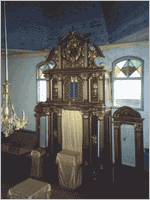The Karaim religion Karaism is actually a pure faith of the Old Testament which dogmas are built on truth written in Bible, that does not accept any authorities commenting on these holy texts orally or in written. None of other Scriptures – neither the New Testament, nor the Talmud or the Koran are holy or codified in the system of the Karaism, they do not provide arguments, do not reflect the tradition (oral or written) in understanding of religious matters. All authentic truth is hidden only in the Old Testament and every Karaim believer has a right to look for it in the text himself. The name of the religion itself (Karaism) reflects its meaning. It derives from the word ‘kara’ which in Arabic and Hebrew languages means ‘to read’, ‘ to recite the Holy Writ’. The Koran is of the same root. The most famous and widely spread theory about the formation of Karaism doctrine says that it started in Mesopotamia in VIII century, in the dynasty of a caliph Abu-Jafar-Abdullah al-Mansur, who governed in 754-775. The idea to oppose the existing rabbinical tradition of commenting upon the Old Testament and its observance came to Anan, the son of David. His famous dictum said: “Thoroughly search Scriptures and do not rely on my opinion”.

(1873-1961),
the highest Karaim priest
Favourable background of Islam increased the number of his followers; the new theory was codified and conceptualised. Gradually, it gained the form of ordinary religion, attracting to the new faith people of different nationalities. Religious doctrine of Karaism was strongly influenced by Islam – from it were taken the principle of analogy (kyjas), of trusting human free will, the principles of religious terms (avoiding anthropomorphic descriptions and replacing them by symbolic concepts), some religious dogmas (kybla), separate concepts (kurban). It is agreed that initially, Anan the son of David got the knowledge of Islam from Abu-Hanifa, the man who established one of canonical schools of Islam.

1994
Khazar’s kaganate, spread over southern territories of contemporary Russia, in the 9 th cent. being at its blossom was famous for its religious tolerance. Karaim missionaries reached the kaganate in 8 – 10 cent. passed their faith to some Turkish tribes (Khasars, Kipchaks-Kumans, and others), living in the southern steppes of Russia and Crimea. Common language and religion united these tribes as a nation for a long time; the name of religion became ethnonym. Contemporary Lithuanian Karaims are the descendants of those tribes.

